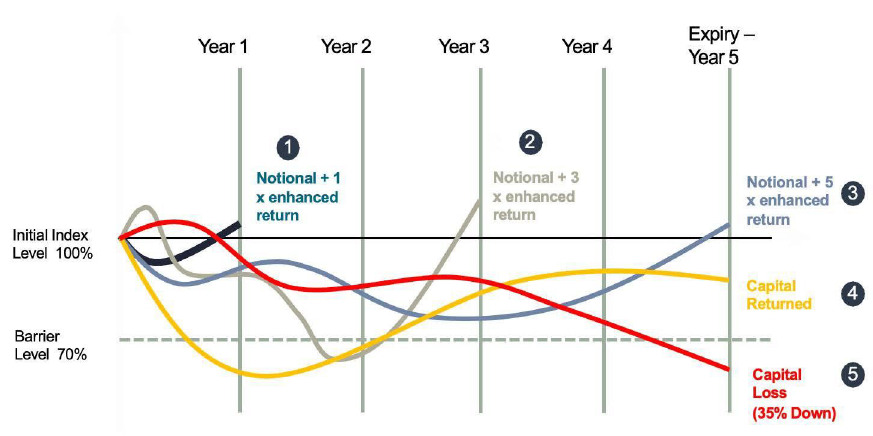Blogs
Read our latest news and industry insights.
Ruvan J Grobler

The Bovest Twilight Webinar Series is meticulously designed for medical professionals who are not only clinicians but also business owners. We delve into the crucial aspects of running a successful medical practice, offering actionable business insights and strategies that aren't typically covered in medical school. Each session is fully CPD accredited (10 ethics points), ensuring you earn valuable points while enhancing your practice management skills. Join a community of forward-thinking peers and learn from industry experts to transform your practice into a thriving business. International and local experts in finance, law, strategy, tech and medical marketing come together to reshape the future of private practice. The Bovest Twilight Webinar Series helps doctors turn good ideas into great practices — from first patients to full-scale growth. The series will be hosted in January 2026 supported by APS Africa, LLM Pretorius Davies Inc, Global Z-Data and myMed Marketing. Bovest Wealth Managers, Ruvan J Grobler and PJ Botha will host two sessions: 5 Common Financial Mistakes Doctors Make – 29 January 2026, 18:00-19:00 Estate Planning for Doctors – 12 February 2026, 18:00-19:00 Register at webinars.doceohealth.co.za Ruvan J Grobler RFP™ (PGDip Financial Planning)

It’s often said that the only certainties in life are death and taxes. While it’s not the most cheerful topic, understanding how taxes work when someone passes away can make a difficult time a little less overwhelming. This article aims to unpack the key tax considerations in a straightforward way, so you can plan ahead and ensure the estate is handled efficiently and in accordance with the law but also to give a little perspective on the advice we give as wealth managers. Beneficiaries of deceased estates are often shocked and upset when they see the taxes payable in the estate. Understandable of course, as this eats into their inheritance. Here are a few examples of some of the tax liabilities a deceased estate may face: Estate duty: Levied on the total value of your dutiable estate. 20% levied for deceased estates of more than R3 500 000 and 25% for deceased estates of more than R30 000 000. Transfer Duty: Levied on the transfer of ownership of immovable property from the estate to the beneficiary of the immovable property as set out in the last will. Income Tax: General Income: Income from salaried employment as well as rental income will be taken into account up to the date of death. Can include income earned as a sole proprietor. Income from Investments: This can be in the form of Life- or Living annuity income payments but also interest earnings from discretionary investments or savings vehicles. All rebates and exemptions for the tax year will be apportioned up to date of death. Capital Gains Tax: Capital gains tax can be levied on the gain that arises from the sale of assets to provide cashflow for the estate or beneficiaries. A change of ownership can also trigger capital gains tax. The annual exclusion in the year of death is R300 000 instead of the normal R40 000 annual exclusion. It’s important to plan and make provision for these costs in your estate, there may be more moving parts if the deceased held offshore assets. Here are a few ways to reduce your estate’s tax burden: Acquire (or move) assets through structures like trusts or companies. Invest in tax-efficient discretionary investment structures where the liability is settled in the structure and not in your personal name. Pre- and post-retirement investments do not form part of the dutiable estate if beneficiaries are nominated. No interest earnings- or CGT liabilities are payable on these structures. Ruvan J Grobler RFP™ (PGDip Financial Planning)

In many instances, spouses choose to bequeath their whole estate to each other and the surviving spouse will look after the children. This is also good estate planning. But what will happen to the children and assets should both parents pass away? Underage children can inherit these assets but should be managed through a testamentary trust. A short video summary of the below can be watched here: https://www.instagram.com/reel/DPOqkx3DP1S/?utm_source=ig_web_copy_link&igsh=MzRlODBiNWFlZA== What Is a Testamentary Trust? A testamentary trust is a legal entity created in terms of a person’s Will, which only comes into effect upon their death. Unlike inter vivos trusts, it is not operational during the testator’s lifetime. The Will serves as the trust instrument, and the testator is the founder. How Is It Created? Drafting the Will: The Will must clearly state the intention to create a trust, name the beneficiaries, identify the assets to be placed in trust, and outline the terms and conditions. Activation: Upon death, the nominated trustees apply to the Master of the High Court for Letters of Authority to manage the trust. Trustees: It’s advisable to appoint at least one independent trustee with fiduciary expertise to ensure proper governance. Why Should Clients Consider It? Protection for Minor Children: Minors cannot legally inherit until age 18. A testamentary trust ensures their inheritance is managed responsibly until they reach maturity. Special Needs Planning: A Type A Special Trust offers tax-efficient support for beneficiaries with disabilities. Asset Preservation: Prevents reckless spending by beneficiaries. Trustees manage and distribute assets according to the testator’s wishes. Managing Indivisible Assets: Useful for assets like farms or holiday homes that cannot be easily split among heirs. Tax Efficiency: Testamentary trusts may offer tax advantages, especially in the case of special trusts. Important Considerations Validity of the Will: If the Will is invalid, the trust cannot be established. Professional drafting is essential. Trustee Selection: Trustees must be trustworthy, capable, and ideally include an independent party to avoid conflicts. Costs & Complexity: Testamentary trusts involve legal and administrative costs. Clients should be made aware of ongoing compliance and management responsibilities. Family Dynamics: Clear communication and transparency in the Will can help prevent disputes among beneficiaries. Contact me at ruvan@bovest.co.za for more information. Ruvan J Grobler RFP™ (PGDip Financial Planning)

Debt is often used in case of emergencies but can also be used as leverage to finance the purchase of assets that would otherwise be out of reach. In the case of good- and bad debt, the repayment strategy will help manage cashflow and lower the costs of borrowing. The aim of this article is to help you pay of good debt earlier but may also help those individuals who are under pressure due to debt, to take control of the situation. It is important firstly to have a comprehensive budget that gives a framework for your spending. This helps you keep track of your cashflow and discourages your emotions from taking over. Before taking out any debt, emergency funds and insurance must form part of your plan. Avoid taking out new debt if it does not fit into the current plan and budget. Why it’s important to have a structured plan for repaying debt: Paying more interest over time : Only paying “what you can, when you can,” your payments might be too small or irregular. The debt repayment takes too long, and you pay more in interest. No clear end date : A plan lets you see exactly when you’ll be debt-free, which can be motivating and helps you track progress. Poor prioritisation : Not all debts cost the same. A structured plan ensures you pay off high-interest or priority debts first. Easier budgeting : Knowing exactly how much you’ll pay each month helps you manage cash flow and identify opportunities for extra repayments. Better discipline and accountability : A structures plan helps to remove any guesswork and prevents emotional spending or skipping of any payments. Repayment Strategies: Snowball Method How it works: List debts from smallest to largest balance. Pay minimums on all and put any extra money into smallest debts first. Positive: Quick wins from paying off small debts early give motivation to keep going. Negative: You might pay more interest over time compared to other methods. Avalanche Method How it works: List debts by interest rate, highest first. Pay minimums on all and put extra money toward the highest-interest debt. Positive: Saves the most on interest and often pays off debt faster overall. Negative: May take longer to see your first “win,” which can be demotivating for some. Debt Consolidation How it works: Combine multiple debts into a single loan (often at a lower interest rate). This could be a personal loan, balance transfer credit card, or home equity loan. Positive: Simplifies payments into one bill and can reduce interest costs. Negative: If you keep borrowing after consolidating, you could end up in deeper debt. Refinancing How it works: Replace an existing loan (e.g., bond, car loan) with a new one at better terms. Positive: Can lower monthly repayments and interest. Negative: Extending the term may cost more in interest over the long run. Ruvan J Grobler RFP™ (PGDip Financial Planning)

Your estate plan evolves as you get older and regular revision of beneficiary nominations on appropriate investments structures becomes a key planning tool. A holistic financial plan is the roadmap to executing these essential estate planning decisions. Let’s explore the importance of beneficiary nominations on your retirement annuity, pension-, provident or preservation funds. Estate Planning: Availability of funds: If the beneficiary nomination is valid, the death benefit will flow directly from the insurer to the beneficiary. This process can be much quicker than the process of winding up the estate. The death benefit can be paid to beneficiaries before other distributions from the estate is made. Estate related fees: By nominating valid beneficiaries, there is no capital inclusion in the deceased’s estate for estate duty and executor fees. This makes it an effective planning tool in reducing the size of the estate and related fees. Estate duty (SARS): 20% of the dutiable estate after R3.5mil and 25% after R30mil. Executor’s fees: Maximum of 4.025% (Including VAT) of the deceased estate. Very Important note: Section 37C of the Pension Funds Act regulates the payment of death benefits. The act aims to identify dependants of the deceased and ensure that death benefit payments are made to them. The trustees appointed by the fund must identify these dependants irrespective of who was nominated by the deceased. The trustees have a duty to conduct a thorough investigation to ensure equitable distribution of death benefits and rely on the financial advisor to provide relevant facts. What if no beneficiaries are nominated? The above process will still follow but it could then be possible that a determination is made to pay the death benefit to the deceased’s estate. The capital will then form part of the estate for purposes of estate duty and executor’s fees. This may also be an intentional decision in order to provide cashflow in the estate for estate related costs or debt. There are however better options in planning for estate cashflow needs. The above is not financial advice and serves only as factual information. Make sure these nominations align with your long-term financial goals and estate planning by consulting with your financial advisor. Ruvan J Grobler RFP™ (PGDip Financial Planning)

In an increasingly interconnected global economy, South African investors are finding compelling reasons to look beyond local borders when building long-term wealth. Offshore investing offers access to broader, more resilient markets, particularly in developed economies with stronger currencies and more stable political environments. Given South Africa’s constrained economic growth, fiscal uncertainty, and the rand’s vulnerability as an emerging market currency, allocating a portion of your portfolio offshore can serve as both a growth engine and a hedge. Investing offshore provides exposure to world-leading companies, industries, and fund managers that are often unavailable in the local market. It allows investors to participate in innovation-led growth in sectors like technology, healthcare, and clean energy, which are typically underrepresented on the JSE. Most importantly, it supports diversification—not just across asset classes, but across geographies, currencies, and economic cycles—reducing concentration risk tied to the South African economy. Key Reasons to Invest Offshore: Diversification: Reduce reliance on South African markets and benefit from a broader global opportunity set. Currency Hedge: Protect your wealth against rand depreciation by investing in hard currencies. Global Access: Gain exposure to top-tier international asset managers and world-class investments. Growth Potential: Participate in faster-growing economies and industries driving global expansion. Important Considerations for South African Tax Residents Before investing offshore, it’s essential to evaluate how your investment aligns with your broader financial planning, particularly around access, succession, taxation, and estate planning: Flexibility: Will you have access to your funds when needed? What types of investments can you hold? Succession Planning: Can your investment be transferred to your heirs? Will Capital Gains Tax (CGT) apply? Tax Compliance: Is the structure tax-efficient, and what must be declared on your tax return? Estate Structuring: Will your investment attract foreign estate duties? Is an offshore executor required? An Efficient Offshore Solution: The Offshore Wrapper A tailored offshore wrapper can simplify many of these complexities, offering a cost-effective and administratively streamlined solution. Key benefits include: No exposure to offshore estate duties No South African executor fees on death No inheritance tax in the offshore jurisdiction Ability to nominate beneficiaries directly for smooth succession Creditor protection for assets held within the structure Consolidation of various investments (e.g., share portfolios, funds) under one structure Minimum investment from $25,000 Tax Treatment The offshore wrapper also provides significant tax efficiency: Taxes are calculated and settled annually by the platform—no action required by the investor CGT is capped at 12%, and income tax at 30% Taxes are applied to USD returns, meaning rand depreciation is not taxed Reach out to me at ruvan@bovest.co.za for more information. Ruvan J Grobler RFP™ (PGDip Financial Planning)

Structured Investments are pre-packaged investment strategies with predetermined payouts and can be linked to a variety of underlying assets (e.g., equities, indices, commodities, or currencies). Some structured products include downside protection, which can cushion losses in adverse market conditions. By diversifying into different protection levels and structures, you can tailor the risk exposure of your overall portfolio. An autocall investment is a structured note that can end early if the linked index, like the Nikkei 225 or Euro Stoxx Select 30 Dividend Index, performs well enough. It runs for a fixed period of five years but is reviewed once a year. If the asset is at or above a certain level on a review date, the note "autocalls": it ends, you get your original money back, plus a set return. If it doesn’t autocall, it keeps going. At the end, if the asset hasn’t fallen too far, you still get your money back. But if it has dropped below a certain threshold, you could lose money based on how much it fell. Who is this for? Investors looking for offshore exposure with a level of capital protection. Minimum R100 000. Credit risk: Structured products are often issued by banks or financial institutions. Spreading investments across different issuers can reduce exposure to the credit risk of any one issuer. In this example Investec is the issuer, but the credit reference can be any of the following: Commerzbank AG, Credit Agricole, BNP Paribas SA. Protection: In this example, 100% capital protection in Rand provided the index does not end below 70% of Initial Index Level.

Is retirement an out-of-date pipedream? With rising living costs and economic uncertainty in South Africa, it’s not surprising that people feel this way. But what we see as “retirement” is changing, the traditional retirement age of 65 has already started to look different because people live longer. We live in a time where passive income and part-time work is as easy as ever and done from anywhere. Although retirement is continually evolving it still is more important than ever to start investing as early as possible and stay consistent over the long-term. Employer matching your pension contributions, should you max it out? Yes definitely. It’s free investment allocations and effectively instantly doubles your contributions. The higher the contributions, the better the compounding effect of the capital. You can also deduct your employer’s contributions together with your own contributions in your annual income tax returns. Are there other ways to supplement your retirement income? There are many discretionary investment structures (non-retirement) that hold massive tax-and estate planning benefits. It's always a good idea to diversify in the structures that you use to invest because they can be so different. This is true for the actual assets as well, never have your eggs in one basket. Building a business or renting out property can also be effective but holds it’s own risks. Should you pick the most aggressive investment option for retirement? If you have time on your side, going more aggressive is the optimal long-term strategy if you can stomach short-term volatility in assets like shares. In South Africa, all pre-retirement structures must adhere to Regulation 28 of the Pension Funds Act and this does limit the level of risk you are able to take with your retirement funds, but alternative structures can supplement your risk appetite. Time in the market is always better than trying to time the market. What are common retirement investment mistakes? Starting too late. Not saving enough, at least 20% of your monthly income should be invested. Regularly switching between different funds and assets due to short-term volatility (bad investor behaviour). A lack of diversification. Failing to adjust your plan as you go – marriage, kids and inflation play a role. Ruvan J Grobler RFP™

Saving for retirement has become somewhat unappealing for many investors. This is due to the lack of flexibility and many moving parts that make it complex. Treasury has been trying to combat the flexibility issue with the introduction of the two-pot system in September 2024. These structures do however have major tax advantages. According to Section 11F of the Income Tax Act, you are allowed to deduct annual contributions made to any pension fund, providend fund or retirement annuity fund. The annual limits are set out as follows to the lesser of: (i) R350 000; (ii) 27,5% of the higher of – • remuneration; or • taxable income; or (iii) taxable income of that person before – • including any taxable capital gain. According to the provisions set out in Section 10C of the Income Tax act, contributions from previous years that were not deductible at the time will be carried forward to the current assessment year unless they were deducted from a retirement fund lump sum, withdrawal benefit, or offset against a compulsory annuity. Arrear contributions are added to the current year's contributions and treated accordingly. Ultimately, these disallowed contributions can be used to offset retirement income until the rollover is depleted. Because it is seen as a deduction against gross income, planning can be done in such a way that no income tax is payable for many years into retirement. The disallowed contribution can also be used to increase the tax-free portion of your 1/3 allowable retirement lump-sum. Important Considerations Upon the investor’s death, the beneficiaries of the annuity will have a choice. They may either take their portion in cash and pay the withdrawal tax, or they can proceed with the annuity. If they decide to take their portion in cash, that portion of the annuity will unfortunately be included in the estate. This consideration will make disallowed contributions less attractive for investors with offshore beneficiaries. Ruvan J Grobler RFP™ (PGDip Financial Planning)

Business owners are wealthy, aren’t they? Most of them are in terms of equity in their own business, their main focus. But personal finance as a business owner goes much deeper and that’s where we’ve seen neglect. Here are two of the biggest mistakes I’ve seen business owners make with their personal finances: Neglect personal finances: Businesses need cash to expand. And all too often, the decision is made to invest all the cash back into the business instead of using a portion to expand personal portfolios. The thinking is always: “expanding the business will provide higher future income”. But this cycle only continues and compounds the personal finance neglect. We see business owners start planning for retirement after building the business their entire life. The retirement plan is to sell the business, but there is no buyer and no personal investment portfolio to fall back on. Insurance overcontribution: Life insurance will most definitely provide for loved ones on your passing and protect your finances against disability and illness. It’s a crucial part of financial planning and the first step towards moving toward financial certainty. But big insurance premiums will not bring you closer to financial freedom. I don’t blame you, there are many financial advisors who use business owners as an opportunity for large premium policies with large upfront commissions. Life insurance should be anchored in financial planning principles, only take out cover for the need identified through comprehensive analysis. Business owners understand risk, and to not diversify your own retirement income is a mistake you’ll come to realize when it’s too late. There can be a healthy mid-point between investing back into your business and investing in your personal finances. We often forget that financial planning provides solutions to problems around tax and estate planning, it’s not merely about insurance and investments. From operational effectiveness to successful distribution, business owners need to prioritize their time. Making it extremely important to have a trustworthy Wealth Manager who can effectively navigate the pitfalls and challenges of a successful business owner’s personal finances. What steps can you take with your Wealth Manager? Review your personal budget. Assess your level of risk and only cover what’s needed. Do a stock take of your investment portfolio. Set financial goals and allocate funds from your budget to reach them. Ruvan J Grobler RFP™ (PGDip Financial Planning)


